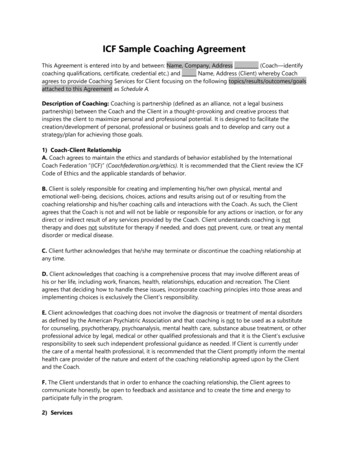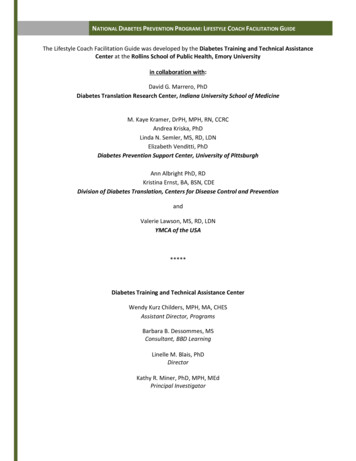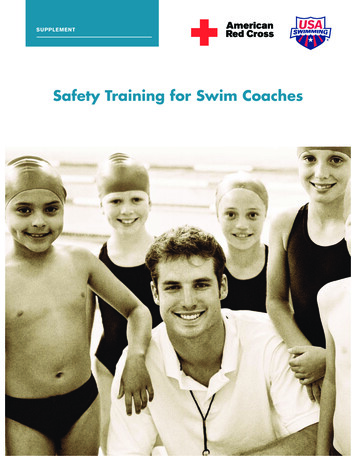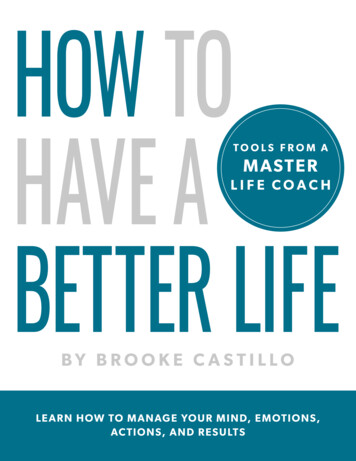
Transcription
Neal ShustermanUnwind
"If more people had been organ donorsUnwinding never would have happened."—THE ADMIRALThe Bill of LifeThe Second Civil War, also known as "The Heartland War," was a long and bloodyconflict fought over a single issue.To end the war, a set of constitutional amendments known as "The Bill of Life"was passed.It satisfied both the Pro-life and the Pro-choice armies.The Bill of Life states that human life may not be touchedfrom the moment of conception until a child reachesthe age of thirteen.However, between the ages of thirteen and eighteen, a parent may choose toretroactively "abort" a child . . . on the condition that the child's life doesn't "technically" end.The process by which a child is both terminated and yet kept alive is called"unwinding."
Unwinding is now a common, and accepted practice in society.Part OneTriplicate"J was never going to amount to much anyway, but now, statistically speaking,there's a better chance that some part of me will go on to greatness somewhere inthe world. I'd rather be partly great than entirely useless."—SAMSON WARD1 Connor"There are places you can go," Ariana tells him, "and a guy as smart as youhas a decent chance of surviving to eighteen."Connor isn't so sure, but looking into Ariana's eyes makes his doubts goaway, if only for a moment. Her eyes are sweet violet with streaks of gray. She'ssuch a slave to fashion— always getting the newest pigment injection the secondit's in style. Connor was never into that. He's always kept his eyes the color theycame in. Brown. He never even got tattoos, like so many kids get these days whenthey're little. The only color on his skin is the tan it takes during the summer, butnow, in November, that tan has long faded. He tries not to think about the factthat he'll never see the summer again. At least not as Connor Lassiter. He stillcan't believe that his life is being stolen from him at sixteen.Ariana's violet eyes begin to shine as they fill with tears that flow down hercheeks when she blinks. "Connor, I'm so sorry." She holds him, and for a momentit seems as if everything is okay, as if they are the only two people on Earth. Forthat instant, Connor feels invincible, untouchable . . . but she lets go, the moment
passes, and the world around him returns. Once more he can feel the rumble ofthe freeway beneath them, as cars pass by, not knowing or caring that he's here.Once more he is just a marked kid, a week short of unwinding.The soft, hopeful things Ariana tells him don't help now. He can barely hearher over the rush of traffic. This place where they hide from the world is one ofthose dangerous places that make adults shake their heads, grateful that theirown kids aren't stupid enough to hang out on the ledge of a freeway overpass. ForConnor it's not about stupidity, or even rebellion—it's about feeling life. Sitting onthis ledge, hidden behind an exit sign is where he feels most comfortable. Sure,one false step and he's roadkill. Yet for Connor, life on the edge is home.There have been no other girls he's brought here, although he hasn't toldAriana that. He closes his eyes, feeling the vibration of the traffic as if it's pulsingthrough his veins, a part of him. This has always been a good place to get awayfrom fights with his parents, or when he just feels generally boiled. But nowConnor's beyond boiled—even beyond fighting with his mom and dad. There'snothing more to fight about. His parents signed the order—it's a done deal."We should run away, "Ariana says. "I'm fed up with everything, too. Myfamily, school, everything. I could kick-AWOL, and never look back."Connor hangs on the thought. The idea of kicking-AWOL by himselfterrifies him. He might put up a tough front, he might act like the bad boy atschool—but running away on his own? He doesn't even know if he has the guts.But if Ariana comes, that's different. That's not alone. "Do you mean it?"Ariana looks at him with her magical eyes. "Sure. Sure I do. I could leavehere. If you asked me."Connor knows this is major. Running away with an Unwind—that'scommitment. The fact that she would do it moves him beyond words. He kissesher, and in spite of everything going on in his life Connor suddenly feels like theluckiest guy in the world. He holds her—maybe a little too tightly, because shestarts to squirm. It just makes him want to hold her even more tightly, but hefights that urge and lets go. She smiles at him."AWOL . . ." she says. "What does that mean, anyway?""It's an old military term or something," Connor says. "It means 'absentwithout leave.'"Ariana thinks about it, and grins. "Hmm. More like 'alive without lectures.'"Connor takes her hand, trying hard not to squeeze it too tightly. She saidshe'd go if he asked her. Only now does he realize he hasn't actually asked yet.
"Will you come with me, Ariana?"Ariana smiles and nods. "Sure," she says. "Sure I will."***Ariana's parents don't like Connor. "We always knew he'd be an Unwind,"he can just hear them saying. "You should have stayed away from that Lassiterboy." He was never "Connor" to them. He was always "that Lassiter boy." Theythink that just because he's been in and out of disciplinary school they have aright to judge him.Still, when he walks her home that afternoon, he stops short of her door,hiding behind a tree as she goes inside. Before he heads home, he thinks howhiding is now going to be a way of life for both of them.***Home.Connor wonders how he can call the place he lives home, when he's about tobe evicted—not just from the place he sleeps, but from the hearts of those who aresupposed to love him.His father sits in a chair, watching the news as Connor enters."Hi, Dad."His father points at some random carnage on the news. "Clappers again.""What did they hit this time?""They blew up an Old Navy in the North Akron mall.""Hmm," says Connor. "You'd think they'd have better taste.""I don't find that funny."Connor's parents don't know that Connor knows he's being unwound. Hewasn't supposed to find out, but Connor has always been good at ferreting outsecrets. Three weeks ago, while looking for a stapler in his dad's home office, hefound airplane tickets to the Bahamas. They were going on a family vacation overThanksgiving. One problem, though: There were only three tickets. His mother,his father, his younger brother. No ticket for him. At first he just figured the ticketwas somewhere else, but the more he thought about it, the more it seemed wrong.So Connor went looking a little deeper when his parents were out, and he foundit. The Unwind order. It had been signed in old-fashioned triplicate. The white
copy was already gone—off with the authorities. The yellow copy wouldaccompany Connor to his end, and the pink would stay with his parents, asevidence of what they'd done. Perhaps they would frame it and hang it alongsidehis first-grade picture.The date on the order was the day before the Bahamas trip. He was going offto be unwound, and they were going on vacation to make themselves feel betterabout it. The unfairness of it had made Connor want to break something. It hadmade him want to break a lot of things—but he hadn't. For once he had held histemper, and aside from a few fights in school that weren't his fault, he kept hisemotions hidden. He kept what he knew to himself. Everyone knew that anunwind order was irreversible, so screaming and fighting wouldn't change athing. Besides, he found a certain power in knowing his parents' secret. Now theblows he could deal them were so much more effective. Like the day he broughtflowers home for his mother and she cried for hours. Like the B-plus he broughthome on a science test. Best grade he ever got in science. He handed it to hisfather, who looked at it, the color draining from his face. "See, Dad, my grades aregetting better. I could even bring my science grade up to an A by the end of thesemester." An hour later his father was sitting in a chair, still clutching the test inhis hand, and staring blankly at the wall.Connor's motivation was simple: Make them suffer. Let them know for therest of their lives what a horrible mistake they made.But there was no sweetness to this revenge, and now, three weeks ofrubbing it in their faces has made him feel no better. In spite of himself he'sstarting to feel bad for his parents, and he hates that he feels that way."Did I miss dinner?"His father doesn't look away from the TV. "Your mother left a plate for you."Connor heads off toward the kitchen, but halfway there he hears:"Connor?"He turns to see his father looking at him. Not just looking, but staring. He'sgoing to tell me now, Connor thinks. He's going to tell me they're unwinding me,and then break down in tears, going on and on about how sorry sorry sorry he isabout it all. If he does, Connor just might accept the apology. He might evenforgive him, and then tell him that he doesn't plan to be here when the Juveycops come to take him away. But in the end all his father says is, "Did you lock thedoor when you came in?""I'll do it now."
Connor locks the door, then goes to his room, no longer hungry forwhatever it is his mother saved for him.***At two in the morning Connor dresses in black and fills a backpack with thethings that really matter to him. He still has room for three changes of clothes. Hefinds it amazing, when it comes down to it, how few things are worth taking.Memories, mostly. Reminders of a time before things went so wrong between himand his parents. Between him and the rest of the world.Connor peeks in on his brother, thinks about waking him to say good-bye,then decides it's not a good idea. He silently slips out into the night. He can't takehis bike, because he had installed an antitheft tracking device. Connor neverconsidered that he might be the one stealing it. Ariana has bikes for both of themthough.Ariana's house is a twenty-minute walk, if you take the conventional route.Suburban Ohio neighborhoods never have streets that go in straight lines, soinstead he takes the more direct route, through the woods, and makes it there inten.The lights in Ariana's house are off. He expected this. It would have beensuspicious if she had stayed awake all night. Better to pretend she's sleeping, soshe won't alert any suspicion. He keeps his distance from the house. Ariana's yardand front porch are equipped with motion-sensor lights that come on wheneveranything moves into range. They're meant to scare off wild animals andcriminals. Ariana's parents are convinced that Connor is both.He pulls out his phone and dials the familiar number. From where he standsin the shadows at the edge of the backyard he can hear it ring in her roomupstairs. Connor disconnects quickly and ducks farther back into the shadows,for fear that Ariana's parents might be looking out from their windows. What isshe thinking? Ariana was supposed to leave her phone on vibrate.He makes a wide arc around the edge of the backyard, wide enough not toset off the lights, and although a light comes on when he steps onto the frontporch, only Ariana's bedroom faces that way. She comes to the door a fewmoments later, opening it not quite wide enough for her to come out or for him togo in."Hi, are you ready?" asks Connor. Clearly she's not; she wears a robe oversatin pajamas. "You didn't forget, did you?""No, no, I didn't forget. . . ."
"So hurry up! The sooner we get out of here, the more of a lead we'll getbefore anyone knows we're gone.""Connor," she says, "here's the thing . . ."And the truth is right there in her voice, in the way it's such a strain for herto even say his name, the quiver of apology lingering in the air like an echo. Shedoesn't have to say anything after that, because he knows, but he lets her say itanyway. Because he sees how hard it is for her, and he wants it to be. He wants itto be the hardest thing she's ever done in her life."Connor, I really want to go, I do . . . but it's just a really bad time for me.My sister's getting married, and you know she picked me to be the maid of honor.And then there's school.""You hate school. You said you'd be dropping out when you turn sixteen.""Testing out," she says. "There's a difference.""So you're not coming?""I want to, 1 really, really want to . . . but I can't.""So everything we talked about was just a lie.""No," says Ariana. "It was a dream. Reality got in the way, that's all. Andrunning away doesn't solve anything.""Running away is the only way to save my life," Connor hisses. "I'm about tobe unwound, in case you forgot."She gently touches his face. "1 know," she says. "But I'm not."Then a light comes on at the top of the stairs, and reflexively Ariana closesthe door a few inches."Ari?" Connor hears her mother say. "What is it? What are you doing at thedoor?"Connor hacks up out of view, and Ariana turns to look up the stairs."Nothing, Mom. I thought I saw a coyote from my window and I just wanted tomake sure the cats weren't out.""The cats are upstairs, honey. Close the door and go back to bed.""So, I'm a coyote," says Connor.
"Shush," says Ariana, closing the door until there's just a tiny slit and all hecan see is the edge of her face and a single violet eye. "You'll get away, I know youwill. Call me once you're somewhere safe." Then she closes the door.Connor stands there for the longest time, until the motion sensor light goesout. Being alone had not been part of his plan, but he realizes it should have been.From the moment his parents signed those papers, Connor was alone.***He can't take a train; he can't take a bus. Sure, he has enough money, butnothing's leaving until morning, and by then they'll be looking for him in all theobvious places. Unwinds on the run are so common these days, they have wholeteams of Juvey-cops dedicated to finding them. The police have it down to an art.He knows he'd be able to disappear in a city, because there are so manyfaces, you never see the same one twice. He knows he can also disappear in thecountry, where people are so few and far between; he could set up house in an oldbarn and no one would think to look. But then, Connor figures the policeprobably thought of that. They probably have every old barn set up to spring likea rat trap, snaring kids like him. Or maybe he's just being paranoid. No, Connorknows his situation calls for justified caution—not just tonight, but for the nexttwo years. Then once he turns eighteen, he's home free. After that, sure, they canthrow him in jail, they can put him on trial—but they can't unwind him. Survivingthat long is the trick.Down by the interstate there's a rest stop where truckers pull off the roadfor the night. This is where Connor goes. He figures he can slip in the back of aneighteen-wheeler, but he quickly learns that truckers keep their cargo locked. Hecurses himself for not having forethought enough to consider that. Thinkingahead has never been one of Connor's strong points. If it was, he might not havegotten into the various situations that have plagued him over these past fewyears. Situations that got him labels like "troubled" and "at risk," and finally thislast label, "unwind."There are about twenty parked trucks, and a brightly lit diner where half adozen truckers eat. It's 3:30 in the morning. Apparently truckers have their ownbiological clocks. Connor watches and waits. Then, at about a quarter to four, apolice cruiser pulls silently into the truck stop. No lights, no siren. It slowlycircles the lot like a shark. Connor thinks he can hide, until he sees a secondpolice car pulling in. There are too many lights over the lot for Connor to hide inshadows, and he can't bolt without being seen in the bright moonlight. A patrolcar comes around the far end of the lot. In a second its headlights will be on him,so he rolls beneath a truck and prays the cops haven't seen him.He watches as the patrol car's wheels slowly roll past. On the other side ofthe eighteen-wheeler the second patrol car passes in the opposite direction.
Maybe this is just a routine check, he thinks. Maybe they're not looking for me.The more he thinks about it, the more he convinces himself that's the case. Theycan't know he's gone yet. His father sleeps like a log, and his mother never checkson Connor during the night anymore.Still, the police cars circle.From his spot beneath the truck Connor sees the driver's door of anothereighteen-wheeler open. No—it's not the driver's door, it's the door to the littlebedroom behind the cab. A trucker emerges, stretches, and heads toward thetruckstop bathrooms, leaving the door ajar.In the hairbreadth of a moment, Connor makes a decision and bolts fromhis hiding spot, racing across the lot to that truck. Loose gravel skids out fromunder his feet as he runs. He doesn't know where the cop cars are anymore, but itdoesn't matter. He has committed himself to this course of action and he has tosee it through. As he nears the door he sees headlights arcing around, about toturn toward him. He pulls open the door to the truck's sleeper, hurls himselfinside, and pulls the door closed behind him.He sits on a bed not much bigger than a cot, catching his breath. What's hisnext move? The trucker will be back. Connor has about five minutes if he's lucky,one minute if he's not. He peers beneath the bed. There's space down there wherehe can hide, but it's blocked by two duffle bags full of clothes. He could pull themout, squeeze in, and pull the duffle bags back in front of him. The trucker wouldnever know he's there. But even before he can get the first duffle bag out, the doorswings open. Connor just stands there, unable to react as the trucker reaches in tograb his jacket and sees him."Whoa! Who are you? What the hell you doin' in my truck?"A police car cruises slowly past behind him."Please," Connor says, his voice suddenly squeaky like it was before hisvoice changed. "Please, don't tell anyone. I've got to get out of this place." Hereaches into his backpack, fumbling, and pulls out a wad of bills from his wallet."You want money? I've got money. I'll give you all I've got.""I don't want your money," the trucker says."All right, then, what?"Even in the dim light the trucker must see the panic in Connor's eyes, but hedoesn't say a thing."Please," says Connor again. "I'll do anything you want. ."
The trucker looks at him in silence for a moment more. "Is that so?" hefinally says. Then he steps inside and closes the door behind him.Connor shuts his eyes, not daring to consider what he's just gotten himselfinto.The trucker sits beside him. "What's your name?""Connor." Then he realizes a moment too late he should have given a fakename.The trucker scratches his beard stubble and thinks for a moment. "Let meshow you something, Connor." He reaches over Connor and grabs, of all things, adeck of cards from a little pouch hanging next to the bed. "Did ya ever see this?"The trucker takes the deck of cards in one hand and does a skillful one-handedshuffle. "Pretty good, huh?"Connor, not knowing what to say, just nods."How about this?" Then the trucker takes a single card and with sleight ofhand makes the card vanish into thin air. Then he reaches over and pulls the cardright out of Connor's shirt pocket. "You like that?"Connor lets out a nervous laugh."Well, those tricks you just saw?" The trucker says, "I didn't do em.""I . . . don't know what you mean."The trucker rolls up his sleeve to reveal that the arm, which had done thetricks, had been grafted on at the elbow."Ten years ago I fell asleep at the wheel," the trucker tells him. "Bigaccident. I lost an arm, a kidney, and a few other things. I got new ones, though,and I pulled through." He looks at his hands, and now Connor can see that thetrick-card hand is a little different from the other one. The trucker's other handhas thicker fingers, and the skin is a bit more olive in tone."So," says Connor, "you got dealt a new hand."The trucker laughs at that, then he becomes quiet for a moment, looking athis replacement hand. "These fingers here knew things the rest of me didn't.Muscle memory, they call it. And there's not a day that goes by that I don'twonder what other incredible things that kid who owned this arm knew, beforehe was unwound . . . whoever he was."
The trucker stands up. "You're lucky you came to me," he says. "There aretruckers out there who'll take whatever you offer, then turn you in anyway.""And you're not like that?""No, I'm not." He puts out his hand—his other hand—and Connor shakes it."Josias Aldridge," he says. "I'm heading north from here. You can ride with metill morning."Connor's relief is so great, it takes the wind right out of him. He can't evenoffer a thank-you."That bed there's not the most comfortable in the world," says Aldridge,"but it does the job. Get yourself some rest. I just gotta go take a dump, and thenwe'll be on our way." Then he closes the door, and Connor listens to his footstepsheading off toward the bathroom. Connor finally lets his guard down and beginsto feel his own exhaustion. The trucker didn't give him a destination, just adirection, and that's fine. North, south, east, west—it doesn't matter as long as it'saway from here. As for his next move, well, first he's got to get through this onebefore he can think about what comes next.A minute later Connor's already beginning to doze when he hears the shoutfrom outside."We know you're in there! Come out now and you won't get hurt!"Connor's heart sinks. Josias Aldridge has apparently pulled another sleightof hand. He's made Connor appear for the police. Abracadabra. With his journeyover before it even began, Connor swings the door open to see three Juvey-copsaiming weapons.But they're not aiming at him.In fact, their backs are to him.Across the way, the cab door swings open of the truck he had hidden underjust a few minutes before, and a kid comes out from behind the empty driver'sseat, his hands in the air. Connor recognizes him right away. It's a kid he knowsfrom school. Andy Jameson.My God, is Andy being unwound too?There's a look of fear on Andy's face, but beyond it is something worse. Alook of utter defeat. That's when Connor realizes his own folly. He'd been sosurprised by this turn of events that he's still just standing there, exposed foranyone to see. Well, the policemen don't see him. But Andy does. He catchessight of Connor, holds his gaze, only for a moment . . .
. . . and in that moment something remarkable happens.The look of despair on Andy's face is suddenly replaced by a steely resolvebordering on triumph. He quickly looks away from Connor and takes a few stepsbefore the police grab him—steps away from Connor, so that the police still havetheir backs to him.Andy had seen him and had not given him away! If Andy has nothing elseafter this day, at least he'll have this small victory.Connor leans back into the shadows of the truck and slowly pulls the doorclosed. Outside, as the police take Andy away, Connor lies back down, and histears come as sudden as a summer downpour. He's not sure who he's crying for—for Andy, for himself, for Ariana—and not knowing makes his tears flow all themore. Instead of wiping the tears away he lets them dry on his face like he used towhen he was a little boy and the things he cried about were so insignificant thatthey'd be forgotten by morning.The trucker never comes to check on him. Instead Connor hears the enginestart and feels the truck pulling out. The gentle motion of the road rocks him tosleep.***The ring of Connor's cell phone wakes him out of a deep sleep. He fightsconsciousness. He wants to go back to the dream he was having. It was about aplace he was sure he had been to, although he couldn't quite remember when. Hewas at a cabin on a beach with his parents, before his brother was born. Connor'sleg had fallen through a rotted board on the porch into spiderwebs so thick, theyfelt like cotton. Connor had screamed and screamed from the pain, and the fearof the giant spiders that he was convinced would eat his leg off. And yet, this wasa good dream—a good memory—because his father was there to pull him free,and carry him inside, where they bandaged his leg and sat him by the fire withsome kind of cider so flavorful, he could still taste it when he thought about it.His father told him a story that he can no longer remember, but that's all right. Itwasn't the story but the tone of his voice that mattered, a gentle baritone rumbleas calming as waves breaking on a shore. Little-boy-Connor drank his cider andleaned back against his mother pretending to fall asleep, but what he was reallydoing was trying to dissolve into the moment and make it last forever. In thedream he did dissolve. His whole being flowed into the cider cup, and his parentsplaced it gently on the table, close enough to the fire to keep it warm forever andalways.Stupid dreams. Even the good ones are bad, because they remind you howpoorly reality measures up.
His cell phone rings again, chasing away the last of the dream. Connoralmost answers it. The sleeper room of the truck is so dark, he doesn't realize atfirst that he's not in his own bed. The only thing that saves him is that he can'tfind his phone and he must turn on a light. When he finds a wall where hisnightstand should be, he realizes that this isn't his room. The phone rings again.That's when it all comes back to him, and he remembers where he is. Connorfinds his phone in his backpack. The phone ID says the call is from his father.So now his parents know he's gone. Do they really think he'll answer hisphone? He waits until voicemail takes the call, then he turns off the power. Hiswatch says 7:30 a.m. He rubs the sleep out of his eyes, trying to calculate how farthey've come. The truck isn't moving anymore, but they must have traveled atleast two hundred miles while he slept. It's a good start.There's a knock on the door. "Come on out, kid. Your ride's over."Connor's not complaining—it was outrageously generous of this truck driverto do what he did. Connor won't ask any more of him. He swings open the doorand steps out to thank the man, but it's not Josias Aldridge at the door. Aldridgeis a few yards away being handcuffed, and in front of Connor is a policeman: aJuvey-cop wearing a smile as big as all outdoors. Standing ten yards away isConnor's father, still holding the cell phone he had just called from."It's over, son," his father says.It makes Connor furious. I'm not your son! He wants to shout. I stoppedbeing your son when you signed the unwind order! But the shock of the momentleaves him speechless.It had been so stupid of Connor to leave his cell phone on—that's how theytracked him—and he wonders how many other kids are caught by their own blindtrust of technology. Well, Connor's not going the way Andy Jameson did. Hequickly assesses the situation. The truck has been pulled over to the side of theinterstate by two highway patrol cars and a Juvey-cop unit. Traffic barrels past atseventy miles per hour, oblivious to the little drama unfolding on the shoulder.Connor makes a split-second decision and bolts, pushing the officer against thetruck and racing across the busy highway. Would they shoot an unarmed kid inthe back, he wonders, or would they shoot him in the legs and spare his vitalorgans? As he races onto the interstate, cars swerve around him, but he keeps ongoing."Connor, stop!" he hears his father yell. Then he hears a gun fire.He feels the impact, but not in his skin. The bullet embeds in his backpack.He doesn't look behind him. Then, as he reaches the highway median, he hearsanother gunshot, and a small blue splotch appears on the center divider. They'refiring tranquilizer bullets. They're not taking him out, they're trying to take him
down—and they're much more likely to fire tranq bullets at will, than regularbullets.Connor climbs over the center divider, and finds himself in the path of aCadillac that's not stopping for anything. The car swerves to avoid him, and bysheer luck Connor's momentum takes him just a few inches out of the Caddy'spath. Its side mirror smacks him painfully in the ribs before the car screeches to ahalt, sending the acrid stench of burned rubber up his nostrils. Holding hisaching side, Connor sees someone looking at him from an open window of thebackseat. It's another kid, dressed all in white. The kid is terrified.With the police already reaching the center divider, Connor looks into theeyes of this frightened kid, and knows what he has to do. It's time for anothersplit-second decision. He reaches through the window, pulls up the lock, andopens the door.2 RisaRisa paces backstage, waiting for her turn at the piano.She knows she could play the sonata in her sleep—in fact, she often does. Somany nights she would wake up to feel her fingers playing on the bed sheets. Shewould hear the music in her head, and it would still play for a few moments aftershe awoke, but then it would dissolve into the night, leaving nothing but herfingers drumming against the covers.She has to know the Sonata. It has to come to her as easily as breathing."It's not a competition," Mr. Durkin always tells her. "There are no winnersor losers at a recital."Well, Risa knows better."Risa Ward," the stage manager calls. "You're up."She rolls her shoulders, adjusts the barrette in her long brown hair, then shetakes the stage. The applause from the audience is polite, nothing more. Some ofit is genuine, for she does have friends out there, and teachers who want her tosucceed. But mostly it's the obligatory applause from an audience waiting to beimpressed.Mr. Durkin is out there. He has been her piano teacher for five years. He'sthe closest thing Risa has to a parent. She's lucky. Not every kid at Ohio State
Home 23 has a teacher they can say that about. Most StaHo kids hate theirteachers, because they see them as jailers.Ignoring the stiff formality of her recital dress, she sits
Dec 12, 2006 · Neal Shusterman Unwind "If more people had been organ donors Unwinding never would have happened." —THE ADMIRAL The Bill of Life The Second Civil War, also known as "The Heartland War," w










